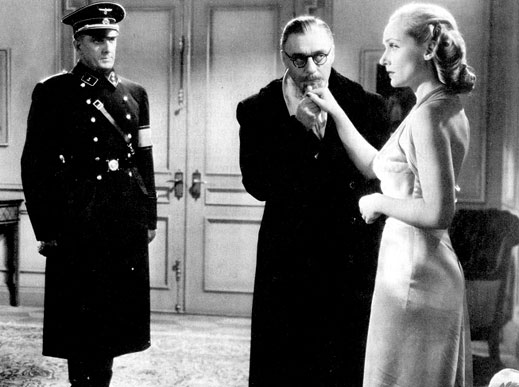TO BE OR NOT TO BE (1942) with Jack Benny and Carole Lombard
Decades before Mel Brooks’ “The Producers”, Ernst Lubitsch directed this backstage comedy about Nazi-occupied Poland. Not your typical idea for a light-hearted comedy, especially in 1942 (production hadn’t even quite finished when Japan attacked Pearl Harbor). But Lubitsch (a German-born Jew who came to Hollywood in 1922) brings out the inanity of it all with subtle, sly humor.
The film is not a spoof or screwball but a quiet undermining of the ridiculousness of Fascism.

It revolves around a theatre troupe rehearsing a play in which they mock Adolf Hitler (his entrance line is “Hail me!”). During dress rehearsal they learn the the Nazis have begun an invasion of Poland. The government makes them halt the production of the play and they extend the run of their current offering, “Hamlet”. Lombard, a famous stage actress out of job once the theatre is bombed, takes on a little light espionage. With Jack Benny, couple of fake mustaches and some gullible Nazis, she leads the mission to prevent information from getting into the wrong hands.
Both stars are incredibly charming, using their talents in the art of understatement. The last film Lombard made before dying in a plane crash, it is easy to see how she won the heart of William Powell, Clark Gable and American film goers.
ANOTHER LANGUAGE (1933) with Helen Hayes and Robert Montgomery
TCM featured Robert Montgomery a couple of months ago and I Tivo’d several for their offerings. I already knew I enjoyed him, having seen him in “Night Must Fall”, but I did not realize the breadth of his work. In addition to acting as the President of the Screen Actors Guild and joining the Navy to rise to the rank of Commander, he also became a successful director (and the first to use 1st person camera angles for the length of a film – Lady in the Lake 1947).
One of the titles TCM chose to show did not display his usual whimsical self. Another Language follows the first three years of newlyweds played by Montgomery and Lombard. Giggly, romantic and newly-eloped the Mr. and Mrs. Victor and Stella Hallam return to everyday life the moment they disembark the ship and Stella quickly learns about Victor’s overbearing mother and snarky family.

Over time she notices that Victor no longer stands up for her. The give and take is gone. rather than go quietly into oblivion, she fights for the relationship they used to have. She refuses to let Mother Hallam guilt her, or take to heart the slicing comments of her sisters-in-law. She even refuses the sincere advances of her new nephew – an easy escape from staid Victorian family to those butterflies-in-the-stomach courting days.
The film was released just 6 months before the Hays Code began to be enforced. Baby Face (1932) with Barbara Stanwyck is often credited with being the film that pushed censors over the edge but Another Language is just as pointed. The loose lifestyle in Baby Face was shocking and lurid but this film is much more grounded in reality. It bears great weight and the ups and downs of this marriage are expertly performed. Montgomery manages to slough off his usual happy-go-lucky attitude and portray a basically good man who has allowed himself to be controlled by others. His habits and attitudes are so ingrained that when his wife lands outside the boundaries he is lost. Even his eyes look empty in this film. Lombard plays a strong, but loving woman. She has no hysteria and she is not of loose morals. She loves her husband very much and makes a play to rescue the man she married from being lost in outdated, suffocating habits. Certainly, an assertive woman who stood up to her husband’s family, would have raised a few eyebrows at the MPPDA.
